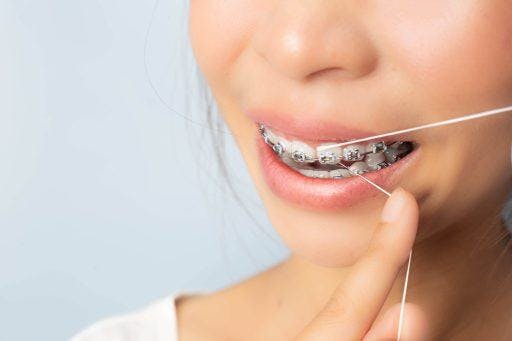The braces you wore during puberty helped you in several ways. They straightened your teeth, improved your oral care, and, eventually, boosted your self-confidence. But this mouth gear has its cons, too. You had to endure mouth sores, discomfort, and, even receding gums.
You might dismiss this because you already wore braces as a teenager. But did you know 25% of people who wore braces in their youth did so again in adulthood? That’s why it’s so important to take extra care of your oral health to protect your teeth from the effects of braces.
What is gum recession?
Gum recession or gingival recession occurs when gums wear away or become pushed back, exposing the roots of the teeth. It is a common enough condition, usually the result of accumulated trauma. Most people fail to notice until the recession has become symptomatic.
Causes of gum recession
Many factors lead to receding gums, including:
- Physical trauma from excessive or vigorous brushing
- Inflammation of gum tissue due to periodontal disease
- Periodontal treatments like surgery
- Lip or tongue piercings
- Hereditary factors
Symptoms of gum recession
Watch for these symptoms:
- Red, swollen gums
- Sensitivity to heat or cold
- Persistent bad breath
- Bleeding gums after brushing or flossing
- Teeth pain
- Pain along the gum line
- Loose teeth
What happens if you don’t fix receding gums?
If left untreated, gum recession can lead to gum disease, which, consequently, can cause gum loss. A study in Oral & Implantology shows that individuals who smoke and drink alcohol are at greater risk of having gum problems. In addition, receding gums could also develop in patients with HIV and diabetes.
How braces might affect gums
Wearing braces and wondering if you are at risk? A 2014 study demonstrates that increased gum recession is a risk for those undergoing orthodontic treatment. However, the result is only about half a millimetre – practically negligible. Other research confirms that orthodontic treatment has little to no effect on the gums.
Keep in mind, braces alone are not the primary cause of gum recession. Poor oral hygiene remains the reason behind many dental problems. So, consult your dentist if you have any gum recession symptoms before getting orthodontic treatment.
Getting braces when you have compromised gums could lead to severe dental problems. You know how braces apply pressure to move your teeth into a desired position? On weak gums, this pressure could impact the bone surrounding the dental roots. It could cause other issues, such as bone density loss and gum sensitivity.
Other effects from braces

While there isn’t much research that supports a direct link between wearing braces and gum recession, other factors are worth considering before getting braces. Experiencing side effects like discomfort and irritation, especially during the initial stage of wearing braces, is common. But if you’re not particularly careful, the wires and brackets can get in the way of proper teeth cleaning.
People who wear braces know that brushing and flossing can turn into a bit of an ordeal. Food particles left in hard-to-reach areas may rot and can result in tooth decay. You might have difficulty chewing food or develop a lisp – at least after a tightening.
How to prevent gum recession

To avoid gum recession, be mindful of how you brush – whether or not you have braces. Choose a soft-bristled brush and gently brush in circular motions to prevent wearing away any gum tissue. Gentle brushing is also friendlier to your dental enamel.
Opting for a non-traditional modern treatment like dental aligners will be a less harsh alternative for your gums. ClearCorrect, the Straumann Group’s flagship orthodontic brand, swaps the pressurised push and pull from braces with a gentle, more targeted approach, slowly but surely bringing your teeth millimetres closer to their perfect position as you continue wearing them.
Take this online smile assessment to know if you’re a candidate for clear aligners.
Several factors can lead to receding gums. The most challenging part is that it happens incrementally, so you might not notice until it’s too late. When it comes down to it, maintaining a good oral care routine by brushing, flossing, and regular visits to your dentist will spare your gums from any complications. While braces are not a direct cause of gum loss, it’s nice to know that there are other solutions to straighten your teeth without (quite literally) being so hard on your gums.
References:
Tettamanti, L., Gaudio, R. M., Iapichino, A., Mucchi, D., & Tagliabue, A. (2017). GENETIC SUSCEPTIBILITY AND PERIODONTAL DISEASE: A RETROSPECTIVE STUDY ON A LARGE ITALIAN SAMPLE. Oral & Implantology, 10(1), 20.
Böke, F., Gazioglu, C., Akkaya, S., & Akkaya, M. (2014). Relationship between orthodontic treatment and gingival health: A retrospective study. European Journal of Dentistry, 08(03), 373–380.
Correlation between mandibular central incisor proclination and gingival recession during fixed appliance therapy. (2002). PubMed.



